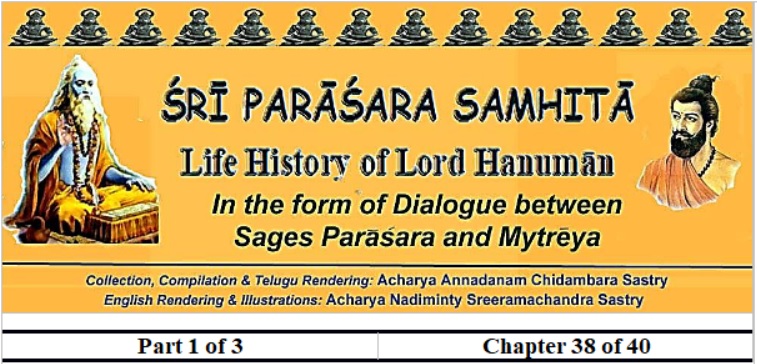
38th Chapter (Aştatrinśatpaţalah)
“The Story of the History of Yavanāśwa”
(Yavanāśwa Caritra Kathanam)
श्रीमैत्रये :-
श्लोक।। पराशर महायोगिन् मारुते: परमद्भुतं
वद मन्त्रप्रभावं मे श्रोतुमिच्छामि तत्त्वत:।। 1
Mytrēya:
“Oh! Great Yōgi Parāśara! I very much want to hear about the fruits/impact (phala) of the bewildering mantra of Lord Hanumān. Hence tell me about that (1)
श्रीपराशर:
पुरा वाल्मीकिना प्रोक्तं हनुमन्मन्त्रमुत्तमं
संक्षेपत: प्रवक्ष्यामि त्रूणु नान्यमना मुने! 2
Parāśara:
Śrī Sundarīprathama Mantra
Oh! Mytrēya! I am telling you the highly values Hanumanmantra once told by Sage Vālmīki. Listen with utmost concentration. (2)
पुरा काम्भोजनगरे यवनाश्व इति श्रुत:
ब्राह्मणो जटिलो नित्यं शिवपूजापरायण:।। 3
Once upon a time in the city of Kāmbhōja lived a Brāhmin named Yavanāśwa, who had long matted strands of hair (jaţādhāri) and an ardent devotee of Lord Śiva. (3)
उपवासमिषेणैव मोहयामास लौकिकान्
शक्तिक्षेत्रं समागम्य चोवास बहुवत्सरम्।। 4
He made people believe in his concept of fasting (upavāsa). He came to Śaktikşētra (The abode of Power – Pārvati) and lived there for several years. (4)
अर्पितं कुसुमं चापि पंचगव्यफलानि च
केनापि नैव भोज्यानि अन्धकूपे स न्यक्षिपत्।। 5
Without giving to anyone to consume, he used to throw the offerings of flowers, fruits, the five cow products (pańcagavya) into a dilapidated well. (5)
षण्मासं तत्फलाशी च क्षीराज्यमधुसेवक:
अपस्मारी स सम्भूत: तस्मिन् जन्मनि तद्द्विज:।। 6
Because of (excess) consumption of fruits, milk, ghee and honey himself, he developed s life-long disease of faints. (6)
प्रेम्णार्पितुं तु यद्वस्तु तद्दिव्यं वस्तु भक्षयेत्
यस्संत्यजेत्प्रसादं तु सो पस्मारी हि जायते।: 7
An item offered to the God is auspicious and hence must be consumed. Contrary to that one who wastes the auspicious food (prasāda) does get such malady of swoons. (7)
एवं गते बहुदिने ब्राह्मणो गाधिनंदनं
प्रणम्य स्वस्य वृत्तांतं स्वदेहस्थितिमेव च
विज्ञापयामास तदा यवनाश्वो द्विजोत्तम:।। 8
Yavanāśwa meets Viśwāmitra
After many days that Brāhmin named Yavanāśwa, met sage Viśwāmitra, the son of sage Gādhi, and explained his deeds and body condition to him. (8)
श्रुत्वा द्विजस्य वृत्तान्तमशेषं च तपोनिधि:
दयाद्र्रमानसो भूत्वा विश्वामित्रो महामुनि:
ध्यात्वा चोपदिदेशास्मै सुन्दरीप्रथमं मनुम्।। 9
Viśwāmitra, an abode of the power of austerities, herd his plight fully and with mercy, meditated upon the Śrī Sundarīprathama mantra and imparted the same to Yavanāśwa. (9)
श्रीसुन्दरीप्रथममन्त्रस्य वाल्मीकि: ऋषिरुच्यते
आव्म्जेनेयो देवता च मारुतात्मजबीजकम्।। 10
Śrī Sundarīprathama mantra is said to have ‘Vālmīki’ (cretor of Rāmāyaņa) as the sage (ŗşi). (Saying) Āńjanēya’ as the preciding diety and ‘Mārutātmaja’ as the seed (beejam); (10)
शक्तिश्चाप्यंजनासूनुवार्युपुत्रेति कीलकं
मम सकलशब्दं च पुरुषार्थ्ं च उच्चरेत्
विनियोगपदं चैव क्रमेण मनुरुच्यते।। 11
‘Āńjanāsūnuh’ as the power (śakti) and ‘Vāyuputra’ as the key (keelakam), then saying ‘mama sakala purusardha siddhyardhē’ (to me achievement of all the four objectives of human life) and then the usage (viniyōgah), i.e., ‘mama sakala purusardha siddhyardhe japē viniyōgah’. The mantra has to be told in that order. (11)
ध्यानम्
आव्म्जनेयमतिपाटलाननं
काव्म्चनाद्रिकमनीयविग्रहं
पारिजाततरुमलू वासिनं
भावयामि पवमाननन्दनम्।। 12
‘One with a very red face, a body as grand as like the great Mount Mēru, living at the base of the heavenly pārijāta (Harshringar) tree,the son of Wind God, such Āńjanēya, I think of’. (12)
इति ध्यात्वा जपेदार्तो मारुतेर्मनुमादरात्।। 13
Meditating so, humbly and reverentially feeling that Hanumān is the only recourse, this mantra has to be recited. (13)
हनूमानव्म्जनासूनुवार्युपुत्रो महाबल:
कपीन्द्र: पिड्गलाक्षश्च लंड्काद्वीपभयड्कर:।। 14
Saptvinśati (27) Names of Hanumān
Hanumān, Ańjanāsūna (son of Ańjana), Vāyuputra (son of Wind God), Mahābala (mightily strong), Kapīndra (lord of monkeys), Pińgalākņa (one with golden hues eyes), Lankadweepabhayankara (terror to the Lanka island), (14)
प्रभव्म्जनसुतो वीर: सीताशोकविनाशक:
अक्षहन्ता रामसख: रामकार्यधुरन्धर:।। 15
Prabhanjanasuta (Son of strong gales), Veera (valorous one), Śītāśōkavināśaka (remover of Mother Śītā‘s grief), Akşahanta (destroyer of Rāvaņa’s son Akşa), Rāmasakha (follower of Rāma), Rāmakāryadurandhara (adept in performing Rāma’s errands), (15)
महौषधिगिरिहारी वानरप्राणदायक:
हरीशतारकश्चैव मैनाकगिरिभव्म्जन:।। 16
Mahaouşadha giridhāri (one who carried the great medicinal plant-full Sanjīvani mountain), Vānara prāņadāyaka (giver life to the monkey warriors), Vareesa tāraka (one who crossed the sea), Mainākagiri bhanjaka (one who broke the pride of Mount Maināka), (16)
निरव्म्जनो जितक्रोध: कदलीवनसंवृत:
ऊध्र्वरेता महासत्त्व: सर्वमन्त्रप्रवर्तक:।। 17
Niranjana (blemishless one), Jitakrōdha (one in contrl of his anger), Kadalīvana samvŗuta (one surrounded by banana grove), Ūrdhvarētasa (one in control of all senses), Mahāsattva (of great strength), Sarvamantra pravartaka (proponent of all the mantras), (17)
महालिंगप्रतिष्ठाता भाष्यकृज्जगतां वर:
शिवध्यानपरो नित्यं शिवपूजापरायण:।। 18
Mahalińga pratişţţata (establisher of the great phallus form of Śiva), Bhāşyakāra (commentator – on scriptures), Jagadvara (boon to the world), Śivadhyanapara (immersed in meditating on Lord Śiva) and Śivapoojāparāyaņa (devoted to worship of Śiva). (18)
सप्तविंशति संख्याकान्येतानि श्रीहनूमत:
पठन्नामानि स विप्रो नियमेनाप्यतन्द्रित:
तेन शांतिस्समभवदपस्मारस्य धीमत:।। 19
The Impact (Phala)
As that Brahmin recited the (above) 27 names of Lord Hanumān without any hesitation, under its impact, that wise Yavanāśwa’s malady of swooning diminished. (19)
बहुकालं हनूमन्तं ध्यानं कुर्वन् प्रपूजयन्
यवनाश्वो महाविप्र: श्लाघ्ये कांभोजपट्टणे।। 20
After spending a long time in the city of Kāmbjōja in meditation and worshipping Lord Hanumān, (20)
पुत्रमित्रकलत्राद्यै: परिचारैश्च बन्धुभि:
इह भुक्त्वाखिलान्भोगान् पूज्यान्पुण्यफलार्जितान्
आव्म्जनेयप्रभावेन विष्णुलोकमवाप स:।। 21
Having earned auspicious things via austerities and having had happy times with sons, friends, wife and others, camp followers and relatives, attained the world of Vişņu. due to the benevolence of Lord Hanumān. (21)
कथामन्यां प्रवक्ष्यामि प्रतापं श्रीहनुमत:
त्रूणु मैत्रेय विप्रेन्द्र सम्यग्भक्तिसमन्वित:।। 22
The Vişūci Episode
Oh! Best amongst Brahmins! Mytrēya! I am telling you another story about Lord Hanumān’s splendor. Listen with great devotion.(22)
रामे विरलदान्तत्वं लक्ष्मणे पादकिड्किणी
सीतायाश्छिन्नरोमाणि तस्मात्क्लेशसहिष्णुता।। 23
Rāma, Lakşmaņa and Sītā never deviated from the path of righteousness (dharma). Even then the faced toughest difficulties, The bodily features (sāmudrikalakşņa) responsible for the same are described. Rāma’s teeth having gaps in between, small bells (kińkiņī) sounding while Lakşmaņa walks and Sīta’s hair remaining split longitudinally were attributed ti ve the cause of their trials and tribulations. (NOTE: This out of context slōka is not seen in some version and hence it must have been an insertion by some one unknown). (23)
ततो रावणनीताया: सीतायाश्शत्रुकर्शन:
इयेष पदमन्वेष्ट्रुं चारणाचरिते पथि।। 24
Thanks to the invocative hymns by Jāmmbavan and others, enemy- destroyer Hanumān increased his size greatly and decided to cross the sea via the sky route to know the where abouts of Sīta abducted by Rāvaņa. This is uniquely mentioned in the first slōka of Sungarakāńda of Rāmāyaņa. (24)
समुद्रमध्ये ह्रुत्पन्ना अन्तराया: पृथक् पृथक्
तानि सर्वाणि नष्टानि दानमश्रोत्रिये यथा।। 25
The various distinct obstacles created (for Hanumān) in the middle of the sea-crossing have gone waste, just like the doles given to undeserving persons.(25)
ईश्वर:
श्रीरामसेविनां नृणां न कदाचित्क्षय: प्रिये
श्रीरामस्मरणादेव तरंति भवसागरं।। 26
Śiva told Pārvatī, “Oh! Darling! There is never any mishap to people who worship Lord Śrī Rāma. Such people are able to cross the ocean of this mundane world by taking the name of Lord Śrī Rāma”.(26)
रामांकितधरो वार्धिं तीर्णवान्विक्रमेण हि
प्रदोषे प्रविशल्लकां हनूमान्वानरेश्वर:।। 27
Carrying the official seal-bearing ring of Lord Śrī Rāma, valiantly crossing the ocean, Hanumān entered Lanka at dusk.(27)
लंकाप्रवेशसमये लंकानाम निशाचरी
पद्यासनाल्लब्धवरा ताडिता वामबाहुना।। 28
As He was entering Lanka, a Brahma-blessed demoness named Lankiņi hit Him.(28)
नारीति मन्यमानेन ताडिता वामबाहुना
विह्वला विकृताकारा पपात समरक्षितौ।। 29
Because she is a woman, (reluctantly) Hanumān casually hit her with his left hand, which was sufficient to make her lose senses and fall on the ground in an ugly-looking form.(29)
विह्वला भगिनीं ज्ञात्वा ब्रह्मलोकान्निशाचरी
विषूची लोकसंहत्र्री कर्कशा घोररूपिणी।। 30
Story of Vişņu
Stubbornly cruel with ghastly form and capble of harming all the worlds, a demoness named Vişūci, having known that her sister (Lankiņi) is helpless, from the world of Brahma,(30)
आगत्य हनुमन्निकटमुवाचेदं महास्वना
ब्रह्मज्ञावर्तिनी ह्रोषा लंकायां कामरूपिणी।। 31
Came to Hanumān and in a loud voice said, “By the order of the Creator Brahma, she is staying in Lanka, taking any form that she wishes,(31)
हता त्वया कथं वीर लंकिनी भगिनी मम
यद्ब्रह्मवरलब्धा सीत् त्रिविक्रमविशालिनी
तस्मादहं हनष्यिामि क्षणेन त्वां समीरज।। 32
Oh! Valorous one! How was my sister Lankiņi with the all the blessigs of Lord Brahma could be killed by you? Hence, you son of the Wind God, I will kill you right now.Look”(32)
वक्रदण्डं गृहीत्वा सा हनूमन्तं समाययौ
हनुमन्तं तु दण्डेन कर्कशाताडयत्स्वयम्।। 33
Saying so. horrifying Vişūci took a croocked staff, reached near Hanumān and herself started beating Him.(33)
तां ज्ञात्वा लोकसंहस्त्रीं तद्धस्ताद्वक्रदण्डकम्
गृहीत्वा ताडयामास सा पपात ममार च।। 34
Knowing that she is capable of eliminating the entire world, Hanumān took away that croocked staff and started beating her with it, making her fall to the ground.(34)
तस्मिन् क्षणे समायातो ब्रह्मलोकपितामह:
उवाच रामदूतं तं क्रोधविस्फुरितोष्ठकम्।। 35
At that time Brahma, the father of the entire worl, himself came and said so to Lord Rāma’s emissary (Hanumān), whose lips were quivering with great anger. (35)
ज्ञानी त्वं दोषराहित्यं आकल्प परिवर्तनं
दत्वा मदन्तिके वध्वा स्थापिता लोकघातुकी 36
‘Oh! Hanumān! You are repository of wisdom (jgńyāni). You won’t get afflicted with the sin of killing a lady even by killing this world-harming woman Vişūci. You will live unto the end of time (kālakrama). She is kept restrained at my place. (36)
मामनादृत्य सा दुष्टा विषूची लोकघातुकी।। 37
But by cheating me, this evil woman is destroying the world. (37)
इदं लोकहितायैव जपतां पवनात्मज!
अनया पीड्यमानानां मत्र्यानां मर्तुमिच्छताम्।। 38
The present incident is only for the benefit of the world. Oh! Son of Wind God! All the people troubled and being killed by her (will be free) on reciting this mantra of yours, (38)
त्वन्नामस्मरणेनैव त्वन्मंत्रपठनादपि
त्वत्पादपूजनाच्चापि ब्राह्मणानां च पूजनात्।। 39
By repeating your name in mind, by reciting your mantra, by worshipping your lotus feet, by worshipping Brahmins, (39)
शांतिर्नित्यं भवत्येव जपादस्माच्च मारुते।। 40
Thanks to the recitation of this mantra, Oh! Son of Wind God! Always peace will prevail. (40)
श्रीराममुद्रादानं च ये त्रूण्वंत्यादरेण तु
निर्जित्य शत्रून्संग्रामे स्थिरं राज्यं व्रजंति ते।। 41
Whoever listens to the story of Śrī Rāma giving his ring seal (to Hanumān), will win over enemies in war and will establish a kingdom firmly. (41)
भवेल्लेाकहितो धर्म: विषूचीवधकारणात् 42
This episode of killing Vişūci is for the well-being of the world. (42)
सप्तविंशति नामानि लोके च पठंति ये
विषूचीव्याधयस्तेषां न भवंति कदाचन।। 43
Whoever recites your 27 names will never be afflicted by Vişūcivyādhi (noxious loose motions – Cholera). (43)
रामांकितधरो भूत्वा कृत्वा कपिकुलोत्तम! 44
Oh! Greatest of Monkeys! Having carried Rāma’s ring seal and relieving the grief od Mother Śitā (by giving it to her), (44)
श्रीरामात् परमं श्रेयो लब्ध्वा कीर्तिं च सुस्थिरां
नानालोकाधिपो भूत्वा देवदेवो भविष्यसि।। 45
By the blessings of Lord Śrī Rāma, you will be splendorous, attain life-long renown, become Lord of all worlds and God of Gods’. (45)
इत्युक्त्वा तं समाधाय ययौ लोकपितामह:
चचार मारुतिर्लकां राक्षासानां कुले कुले।। 46
Hanuman Studies the Demons
Reasoning with Hanumān with such words, Brahma, the granddad of the world, left. Hanumān entered the homes of each and every demon warrior (in Lanka).(46)
ददर्श राक्षसांस्तत्र वेदघोषसमन्वितां
अग्निहोत्रांश्च वेदांश्च राक्षसानां कुले कुले।। 47
There he heard, in every house, the sacred resonance of the recitation of Vedas and saw fire worship, (47)
दया सत्यं च शौचं च राक्षसानां न विद्यते
भक्षंति मदवस्तूनि ये जना: तामसात्मना।। 48
(But) the demons did not have kindness, respect for truth and hygiene. With aggressive attitude (tāmasabuddhi) they were eating things that generate sexuality. (48)
तेषां दया च सत्यं च शौचं नास्ति न संशय: 49
‘Undoubtedly, these people do not have kindness, truthfulness and cleanliness. Just as the bad natured demon Andhakāsura was killed by Mother Gaurīdēvi, Rāvaņa will be killed in the same way in the near future because of Sītā’. (49)
पुरांधकासुरो गौर्या दुष्टाचारो यथाहत:
तथा हतो दशग्रीव: सीतया च भविष्यति।। 50
Thus the whole matter was told by Śankara to Pārvati. (50)
पार्वत्यै शंकरेणैवं वृत्तांतस्समुदीरित: 51
Ēśwara continued, ‘Brahmins drinking liquor made of palmyrah juice or jaggery (crude Indian sugar) are causes of sin. Some other foods are equal to liquour. And the Vedas stipulate that alcohol must not be consumed. (51)
ईश्वर:
ब्राह्मणानां सुरापेयं गौडाद्या: पापकारणा:
सुराकल्प्यान्यभक्ष्याणि श्रुतिस्तु न सुरां पिबेत्।। 52
Even zinger along with jaggery is equal to liquor. Similarly zinger mixed with rock salt, coconut water kept in a bronze vessel and jaggery and these along with jaggery are also equal to liquor, (52)
आद्र्रकं सगुडं मद्यं सैन्धवं लवणं तथा
नारिकेलांबु कांस्ये च तथा सम्मिश्रितो गुड:।। 53
Scholars say the butter milk sprinkled with toasted mustard seeds, milk and other cow products kept in a copper vessel, as well as jaggery water kept in a copper vessel are also equal to liquour. (53)
सर्षपं चैव तक्रे स्यात्ताम्रगव्यं सुरासमं
तामे्र गुडरसं चैव सुरया तुलितं बुधै:।। 54
Making sound while eating, brushing teeth with the index finger, meal sent by a low born, kissing the face of one during menses, (54)
न शब्दभक्षणं चापि तर्जन्या दन्तशोधनं
शूदप्रेषितभुक्तं च पुष्पिणीमुखसेवनम्।। 55
Untimely taking of head-bath with rubbing body with gram flour, using the left over of the oil kept for worship, onion, cabbage, colostrum milk, rice cooked with yellow gram and others too are equal to the liquor. (55)
अकाले भ्यव्म्जनं चापि शिष्टतैलस्य भक्षणं
पलाण्डूं पललाण्डुंच पीयूषं व्यज्जनं तथा।। 56
Potato, beetroot, red drumstick (raktasigru), tubour of Ceylone Spinach (kumbhaśākhah), lotus-nuts (upodakee) and food left-overs by females are also equal to liquor, (56)
कंदं च रक्तकंदं च रक्तशिग्रं तथैव च
उपोदकीं कुम्भशाकंस्त्रीभिर्भुक्तावशिष्टकम्।। 57
If the above are done after meals of a motherly lady, such untoward things do not apply. Oh! Pārvatī! Consumption of liquour is not bad before reciting remedy to the ill-effects of Venus plnnet (Śukraśāpa), (57)
न दोषो मातृकल्पासु परलोकस्य पीडका:
शुक्रशापात्पुरा देवि! सुरापानं न दुष्यति 58
Oh! Pārvatī! Listen to a happening in this regard, During the Rāthantara kalpa’s (past aeon, so named) Kaliyuga time cycle, when I was existing only for the destruction of the demons towards the end of that time cycle, (58)
अत्रेतिहासं वक्ष्यामि त्रूणु शैलसुते! प्रिये!
पुरा राधंतरे कल्पे वर्तमाने कलौ युगे
कल्पांतरवधार्थाय गते मयि शुचिस्मिते।। 59
Yhe Story of Andhaka
A dwmon named Andhaka, enabled by the boons of Brahma, reached Mount Gōvardhana with the intent of victory over Brahma, Dēvēndra and Vişņu. (59)
अन्धको नाम दैत्येन्द्रो ब्रह्मदत्तवरो बली
ब्रह्माणं वज्रिणं जित्वा चक्रपाणिमनन्तरम्
गोवर्धनं गिरिवरं प्राप्तवान् जयकांक्षया।। 60
While all others faced lots of difficulties, he reached that mountain. (60)
शैलाधिवासमजनि जायमाने न्यमुल्बणं 61
As Śiva’s trident hit the body of Andhaka, more and more bodies of Andhaka took birth. (61)
त्रिशूलक्षतगात्रेभ्यो ह्मान्धकस्य शिवेन वै
तत्र तत्रा पि बहवो ह्रान्धकाकारवर्चस:।। 62
All the moving and immoving worlds filled with them. Nandi (Sacred Bull, the vehicle and the chief aide of Śiva) retracted in to Śiva’s inner premises. (62)
समुत्पन्नास्तु तै: पूर्णं त्रैलोक्यं सचराचरम्
पराड्गमुखगतो नन्दी शिवस्यांत:पुरंगत:।। 63
Oh! Lordess of the Three Worlds (Tripurēśwarī)! Meditating upon you, for your own security sake, Vişņumaya (feminine yogic form of Vişņu) remaining there in your service, (63)
त्वद्गृहे शेमुषीं कृत्वा त्वां ध्यायन् त्रिपुरेश्वरि
त्वद्रक्षणार्थ् निर्दिष्टविष्णुमायां विशारदाम्।। 64
She recognised the oncoming forms (of Andhakas) and created numerous forms of the Mother goddess (Dēvi); All those so created were looking exactly like you. (64)
अभ्यर्णमागतां ज्ञात्वा असृजत् सा हि कामिनी
देव्या विसृष्टा देवेशि! त्वदू्रपिण्यो वरानने।। 65
Each Andhaka form, imagining Pārvati, grabbed such form, Due to the power of Vişņumāya they all turned ugly. Thus each urned into some one else. (65)
तास्वेकां परिजग्राह मृडानीशंड्कया किल
विनिर्गते विरूपास्ते विष्णुमायावशादभूत्
पुनरन्यं च साप्येव पुररन्यं च साप्यभूत्।। 66
Mother Goddess – Rāma – Hanuma
Oh! Pārvatī! After elapse of a lot of time in this manner, angered, thos feminine forms of power, (66)
एवंकाले बहुगते देवि! क्रोधवशंगता: 67
That built a city with nine gates, surrounded by an impassable entrenchment, endowed with wealth, highly erudite, and very powerful because of genesis from the Mother Goddess herself, (67)
नवद्वारां दुराधर्षां नित्यपुष्टां करीषिणीं
पीयूषपरिखां दिव्यां दिव्यसंस्कारसंस्कृतां
सृष्ट्वाधिष्ठाय नगरीं सृष्टा देव्या महाबला:।। 68
Nitya, Nityaklinnam Cāmunda, Vahnivāsini, Madadrava, Vaśini and other yoginis, just ate away all those in the forms of Andhkas. (68)
नित्या च नित्यक्लिन्ना च चामुण्डा वह्निवासिनी
मदद्रवापि योगिन्यो वशिन्याद्याश्शुचिस्मिता:
तान्सर्वान्भक्षयामासुर्दैत्यानन्धकवत् स्थितान् 69
Yōgini named Nityaklinna held that demon bound right in her hair plaits, where he got digested by the end of that Time Cycle (kalpa).(69)
नित्यक्लिन्नापि सहसा जठरे राक्षसर्षभं
कल्पं बभार कल्पांते जीर्णो भूद्राक्षसर्षभ: 70
Similarly, Vēdavati, the auspecious (divya) mirror image of goddess Laşsmi is born as the daughter of Janaka (king of Mithila). (70)
तद्वद्दिव्या रमादेव्या: प्रतिबिंबसमुत्थिता
नीलासिता वेदवती सा जाता जनकात्मजा 71
Oh! Pārvatī! She is there for the welfare of the world. One who hears about the divine appearance of Sītā will eb free of every sadness.(71)
लोकसंकर्षणार्थाय साधु तिष्ठति शोभने!
सीतादर्शनमाकण्र्य वीतशोको भविष्यति 72
Lakşhmi (wealth) alwys remains in such person’s house; never moving away. There will always be spread of male progeny, knowledge and food grains besides development of of the house, oremises and wife in such person’s house’,(72)
लक्ष्मीस्तस्य गृहे नित्यं भविष्यत्यनपायिनी।। 73
Afterwords Hanumān successfully persuaded Rāma to start for the destruction of Rāvaņa (ego). Whoever listens to this victorious episode of Hanumān with devotion, by His grace, will ultimately reach the world of Vişņu (Vişņulōka).(73)
पुत्रव्र्द्दिव्द्धज्र्ञानवृद्धिर्धान्यवृद्धिस्तथैव च
गृहारामकलत्राणां व्रुद्दिर्नित्यं भविष्यति 74
Well pleased with such encouraging words of Hanumān, Rāma (74)
प्रस्थानं रोचयामास रावणवधाय वै
त्रुत्वा य: परमं प्रीत्या हनूमद्विजयांकितम्।। 75
Said, ‘I can give my life to each of your help. As per your day to day service, I am always indebted to you. (75)
आव्म्जनेयप्रसादेन विष्णुलोकं च गच्छति।।
इति मारुतिवाक्येन प्रीतो रघुपितर्भृशम्।। 76
Your body may never age! Because, you have helped a lot. My brother was saved by you in the middle of the night. (76)
श्रीराम:
एकैकस्योपकाराय प्राणान् दास्यामि हे कपे
प्रत्यहं क्रियमाणेन शेषस्य ऋणितो वयम्।। 77
Sugrīva and Vibhīşņa served and obtained kingdoms, repectively. Hanumān! But you are dearest to me you please me without seeking any thing in return. (77)
अड्गिष्वेव जरांयातु यत्वयोपकृतं कपे
यन्निशीथे च हनुमन् भ्राता मे जीवितस्त्वया।। 78
Accept my affectionate hug, which is equal to every thing, Oh! Pink-eyed one! I am giving you a boon – be dextrious in doing everything. (78)
उपकारेण सुग्रीवो राज्यं कांक्षन्विभीषण:
निष्कारणस्तु हनुमन् त्वमेवात: प्रमोदक:।।79
You would perform everything for those that always recite your mantara, takin your name and worshipping you.(79)
सर्वस्वभूतं गृह्णीष्व परिष्वंड्गो मया कृतं
वरं ददामि पिंड्गाक्ष सर्वकार्यपरो भव! 80
Live happily as long as my history is told in the world and as long as the Sun and Moon exist. (80)
त्वन्मन्त्रजापिनां नित्यं त्वन्नामस्मृतिकारिणां
त्वद्रूपपूजकानां च सर्वकार्यपरो भव।। 81
Then, becoming Brahama, create the worlds, be among the three worlds, getting united into me ultimately’. (81)
मत्कथापेक्षिता यावत् यावत्पर्वतसंस्थिति:
यावच्चन्द्रश्च सूर्यश्च तावत्त्वं सुखितो भव।। 82
पश्चाच्चतुर्मुखो भूत्वा सृष्ट्वा लोकान् यथाविधि
मल्लोकवासिभिस्साकं मत्स्वरूपमुपैष्यसि
इति दत्वा वरं राम: अनुजग्राह मारुतिम्।। 83
Thus Rama benefacted Hanumān giving Him boons. (82)
इति श्रीपराशरसंहितायां श्रीपराशरमैत्रेयसंवादे यवनाश्वचरित्रकथनं नाम अष्टात्रिंशत्पटल:
38th Chapter (Aştatrinśatpaţalah) “The Story of the History of Yavanāśwa” (Yavanāśwa caritra kathanam) of Śrī Parāśara Samhitā
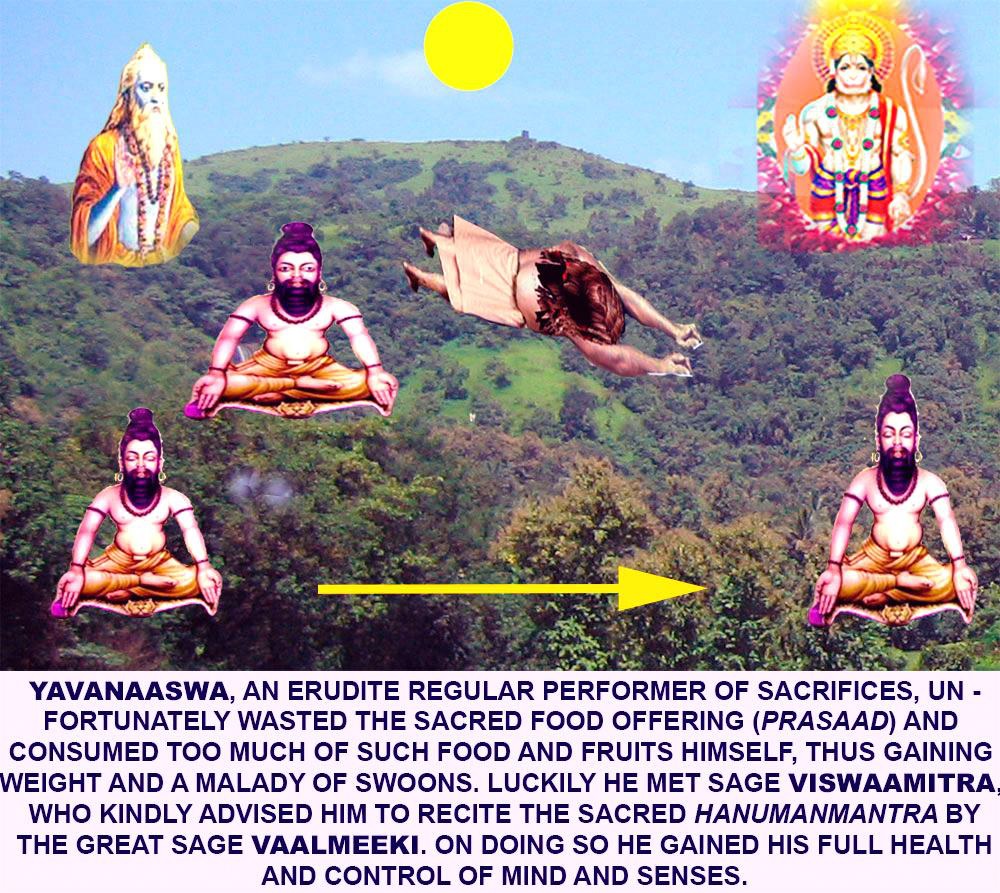
![]()

Click here to visit the Contents of the Part 1.
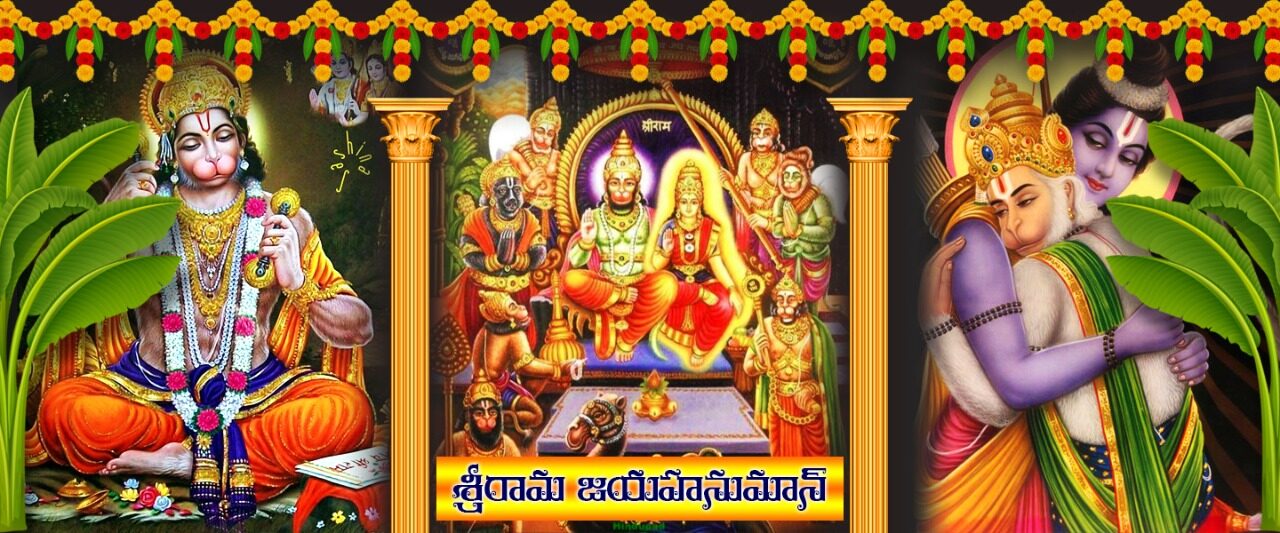
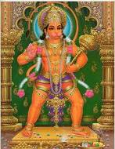

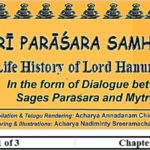
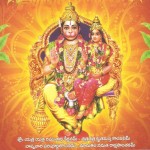

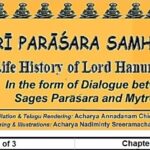
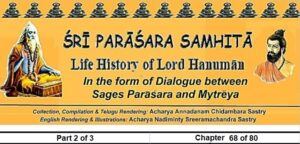
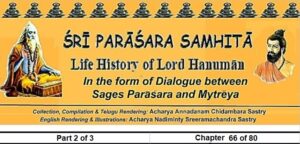
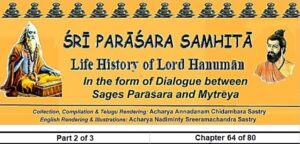
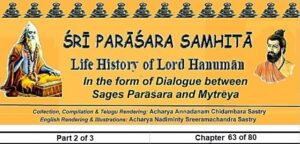
Be First to Comment